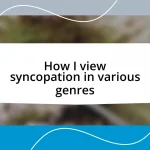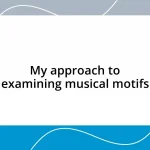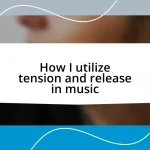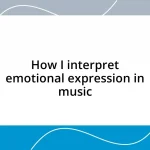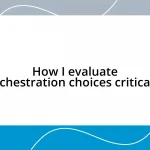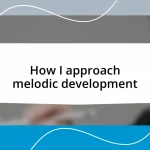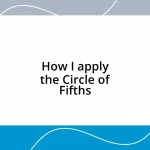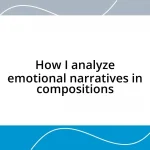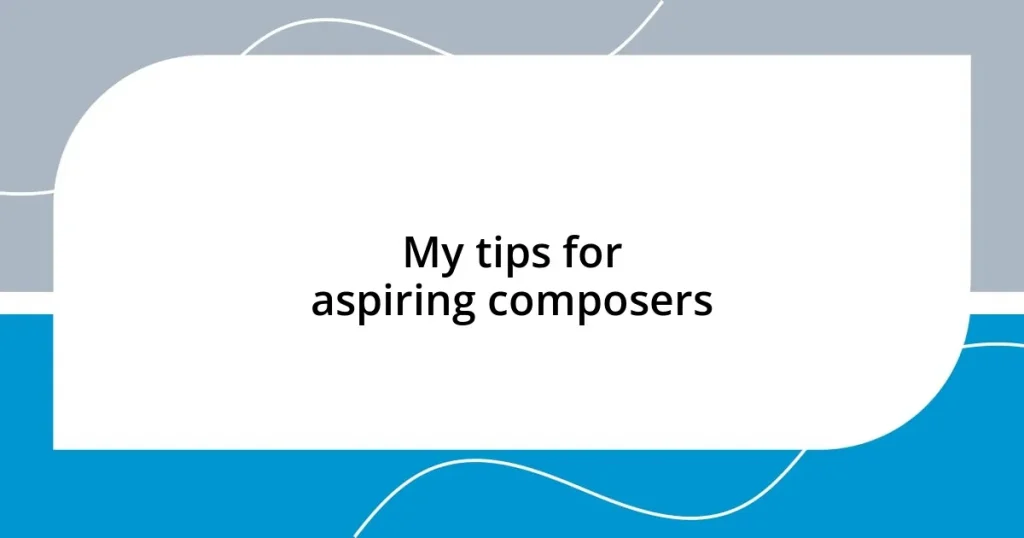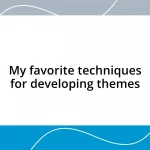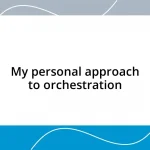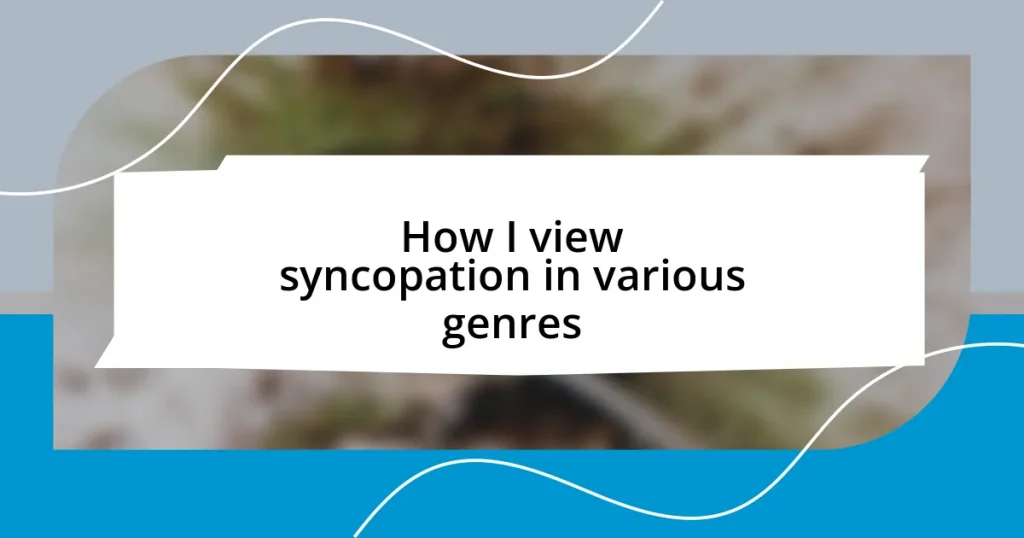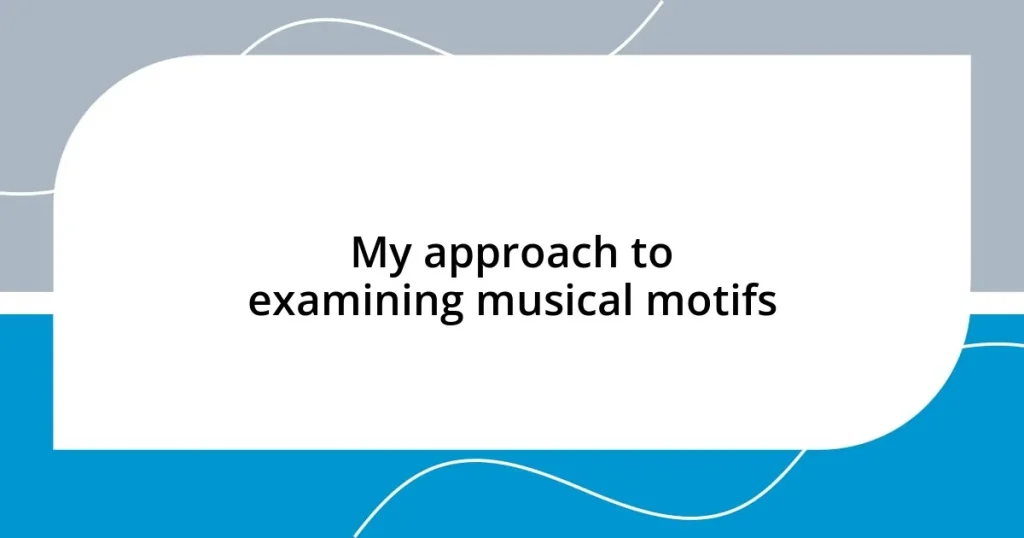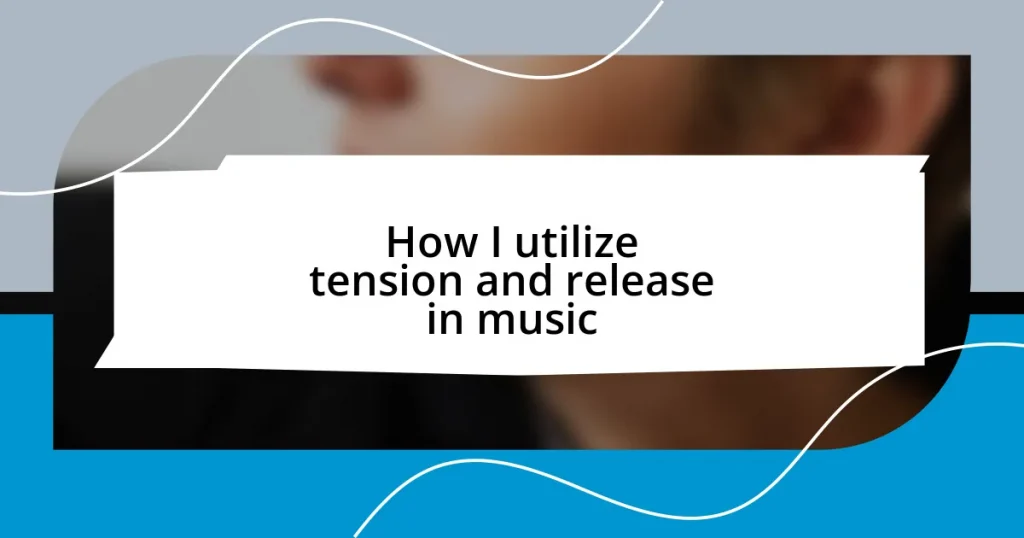Key takeaways:
- Understanding music theory enhances creative expression through concepts like scale degrees, harmony, and rhythm.
- Developing a unique style involves experimentation, reflecting on influences, and seeking feedback.
- Collaboration with other musicians enriches creativity and encourages effective communication for improved outcomes.
- Utilizing technology, such as digital audio workstations, allows for greater experimentation and immediate feedback in composing music.
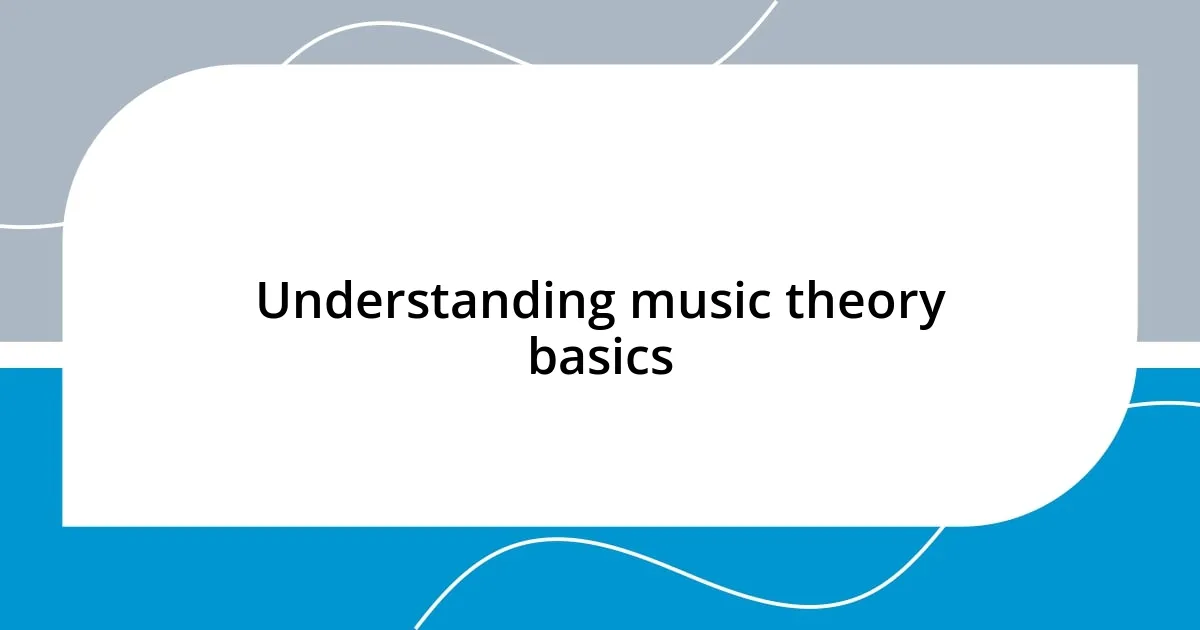
Understanding music theory basics
Understanding the basics of music theory is like unlocking a secret code that empowers you to express yourself through composition. I still remember the first time I grasped the concept of scale degrees—it was like flipping a light switch in my creative process. How can something so simple transform how we approach writing music?
Diving into harmony took my compositions to new heights. I vividly recall experimenting with chord progressions, letting the sound guide my emotions. Did you know that the relationship between chords can evoke specific feelings? It’s fascinating how a transition from a major to a minor chord can completely shift the mood of a piece!
Rhythm is another fundamental element that can’t be overlooked. I often find myself tapping my foot to a beat before jotting down ideas. Have you ever listened to a piece and felt the urge to move? That connection comes from a solid understanding of rhythm and time signatures. It’s thrilling to see how a well-placed rest can build anticipation, making your listeners hang on to every note.
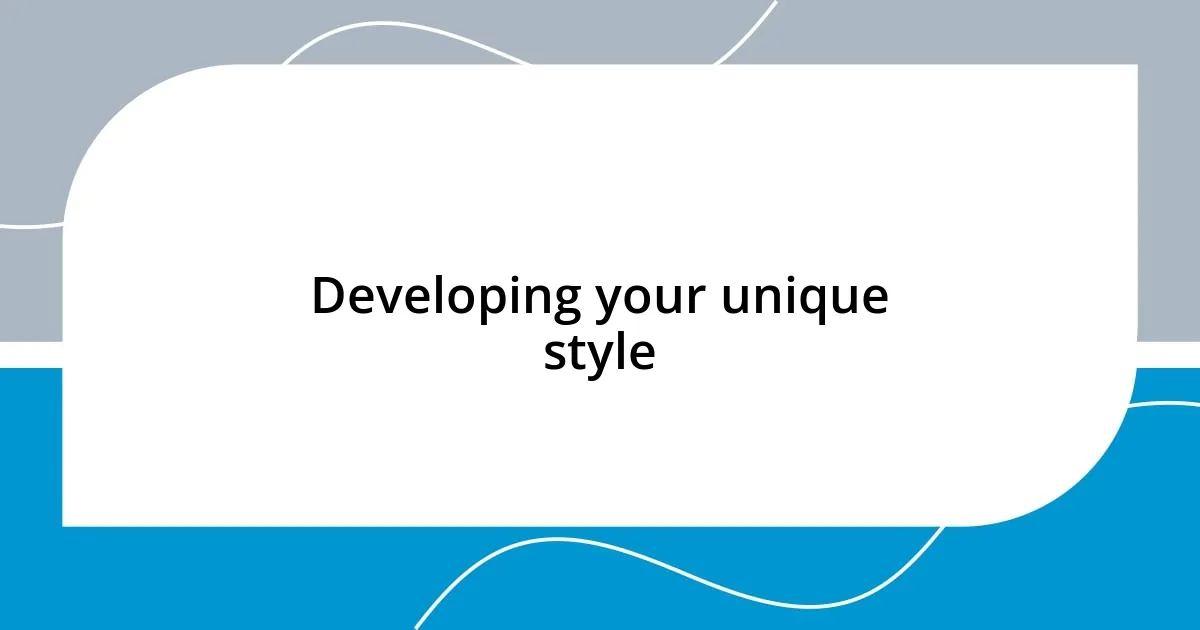
Developing your unique style
Finding your unique style in composition is a deeply personal journey. I remember the moment I started incorporating unexpected elements into my music. Adding an unusual instrument or a surprising rhythmic twist was like adding a splash of color to a gray canvas. It made my work distinctly mine, setting it apart from more conventional compositions.
To help you on this path, here are some tips to cultivate your unique voice:
- Experiment Fearlessly: Don’t be afraid to mix genres or ignore traditional structures. I once combined classical motifs with electronic beats, and the results were exhilarating.
- Reflect on Influences: Think about the music that resonates with you. What elements draw you in? I often draw inspiration from my favorite films; their scores evoke emotions that spark my creativity.
- Keep a Composition Journal: I found jotting down thoughts and ideas before diving into music helps clarify my intent. It’s a fantastic way to discover patterns and themes that truly represent me.
- Solicit Feedback: Share your work with trusted friends or mentors. Their reactions can guide you towards refining your sound. I learned to appreciate constructive criticism that helped me evolve.
- Trust Your Instincts: At the end of the day, listen to your gut. If something feels right, pursue it without hesitation. I’ve often followed whims that have led to some of my proudest moments in composition.
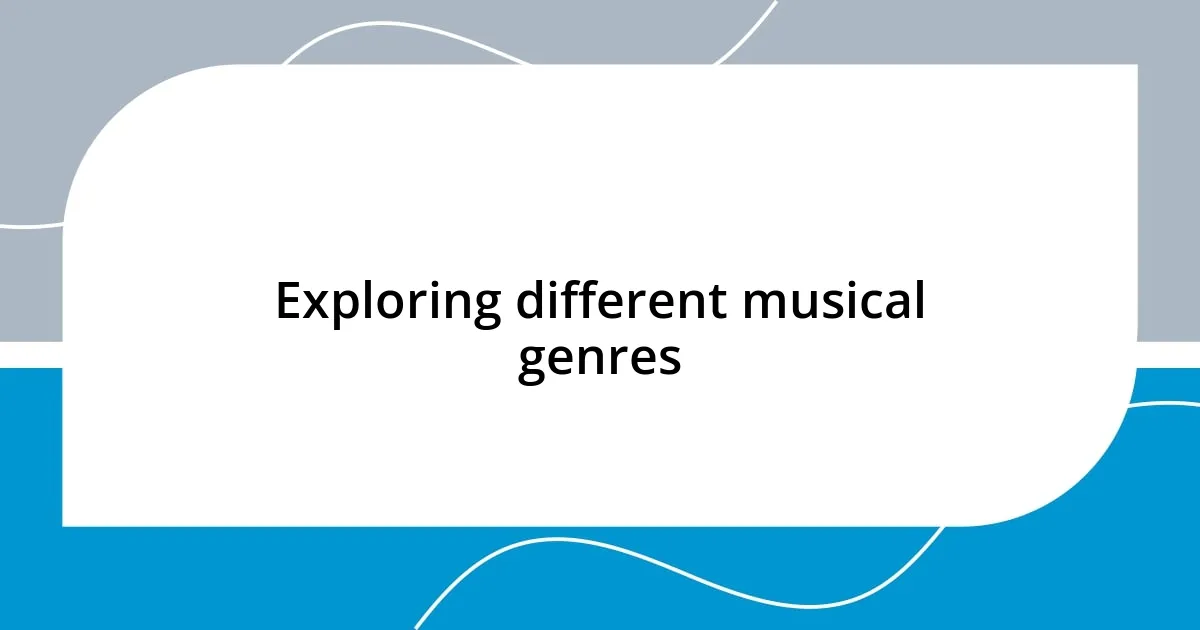
Exploring different musical genres
When exploring different musical genres, you’re essentially diving into a world of limitless possibilities. Each genre has its unique characteristics that influence mood, instrumentation, and even the overall structure of your compositions. I still remember the first time I delved into jazz; the improvisational aspect opened a new dimension in my writing. It was exhilarating to create melodies in real time, letting spontaneity drive my creativity!
Transitioning from pop to classical might seem challenging, but it can yield fascinating results. Pop often emphasizes catchy hooks and repetitive structures—elements I initially found appealing for their accessibility. On the other hand, my experience with classical music forced me to think about thematic development and orchestration in a much more sophisticated manner. Have you ever tried blending these two? The contrast can be remarkable and offers you a broad canvas to express your musical ideas.
Finally, exploring genres like electronic or folk can enrich your palette dramatically. I recall attending a folk music concert where the storytelling aspect resonated deeply with me. This experience encouraged me to experiment with lyrics in my compositions, giving a new, narrative-driven perspective. Each genre brings its own flavor and can shape your music in surprising ways. Which genres have you experimented with, and how have they influenced your growth as a composer?
| Genre | Key Characteristics |
|---|---|
| Jazz | Improvisation, complex chords, swing feel |
| Pop | Catchy melodies, repetitive structures, themes of love or celebration |
| Classical | Orchestration, thematic development, structured forms |
| Folk | Storytelling, acoustic instruments, cultural roots |
| Electronic | Synthesizers, beats, experimental sounds |
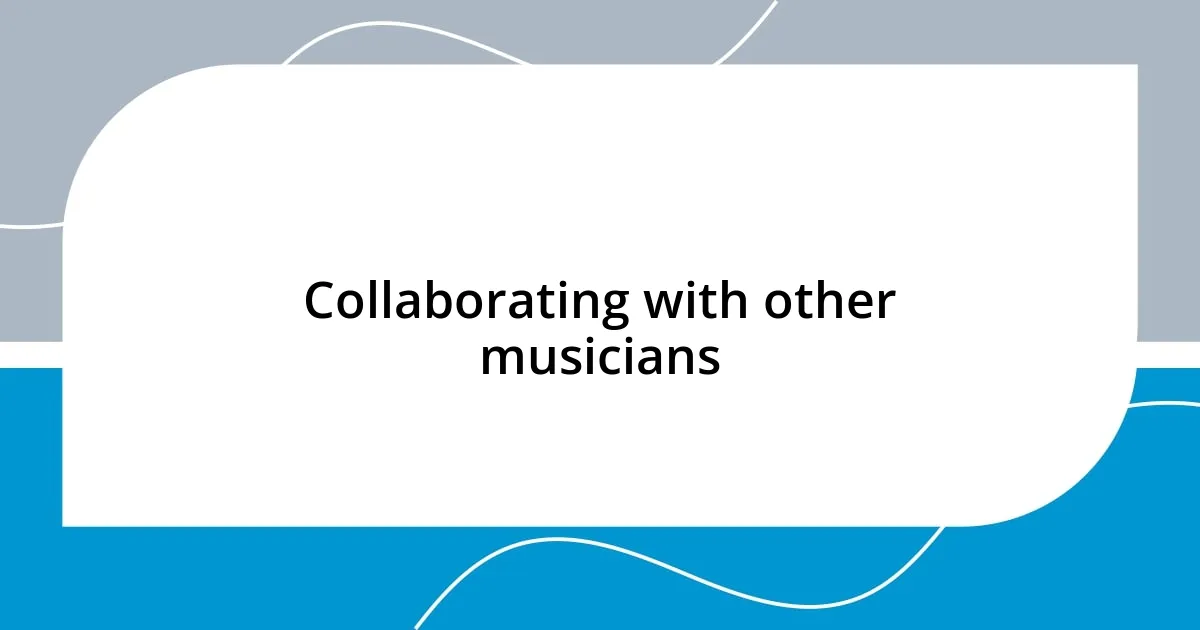
Collaborating with other musicians
Collaboration is one of the most rewarding aspects of being a musician. I remember my first time working with a small band; it was exhilarating to see how our different influences blended together. Each musician brought something unique, and that melting pot of creativity pushed me to think outside my usual boundaries.
I’ve found that working with others often leads to unexpected surprises. For instance, during a recent collaboration, a guitarist introduced me to a chord progression I had never considered before. This moment transformed a simple melody into something rich and complex; it was like discovering a new shade in a color palette. Have you ever experienced a breakthrough in a collaborative setting? Those moments often leave a lasting imprint on your compositions.
Moreover, effective communication is key in collaborations. I learned this the hard way when I was too shy to voice my ideas during a jam session. After that experience, I realized that sharing your vision fosters a more open and creative environment. Engaging in discussions, exchanging feedback, and even navigating disagreements can elevate the music to an entirely new level, enriching both the process and the final product. Remember, the magic often happens when we embrace the synergy of different musical minds.
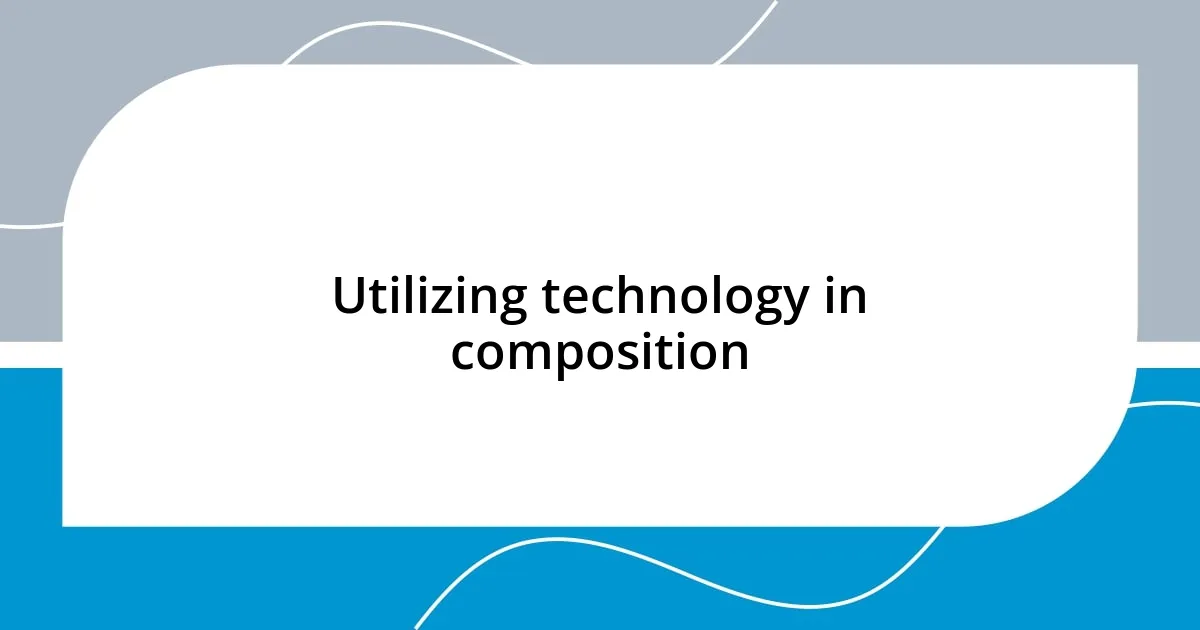
Utilizing technology in composition
Utilizing technology in composition can truly revolutionize how we create music today. I personally remember my first encounter with a digital audio workstation (DAW); it felt like being handed a magic wand! The ability to layer sounds, adjust tempos, and easily edit mistakes completely transformed my approach to songwriting. Have you ever thought about how these tools can enhance your creativity rather than restrict it?
Moreover, software like MIDI (Musical Instrument Digital Interface) enables composers to play with virtual instruments that closely mimic their real-world counterparts. I was astonished at how realistic a virtual piano sounded when I first experimented with it. This allowed me to compose intricate arrangements without needing access to an entire orchestra. Can you imagine the doors it opens, especially for those of us who might not have access to live musicians?
Using technology also allows for immediate feedback and analysis. When I began recording my compositions, I’d often listen back and spot areas for improvement that I would have missed in the moment. It’s like having a personal coach that highlights your strengths and weaknesses—but it’s just you and your software! How has incorporating technology influenced your own creative process? I believe it encourages us to embrace experimentation, leading to unexpected and exciting musical discoveries.
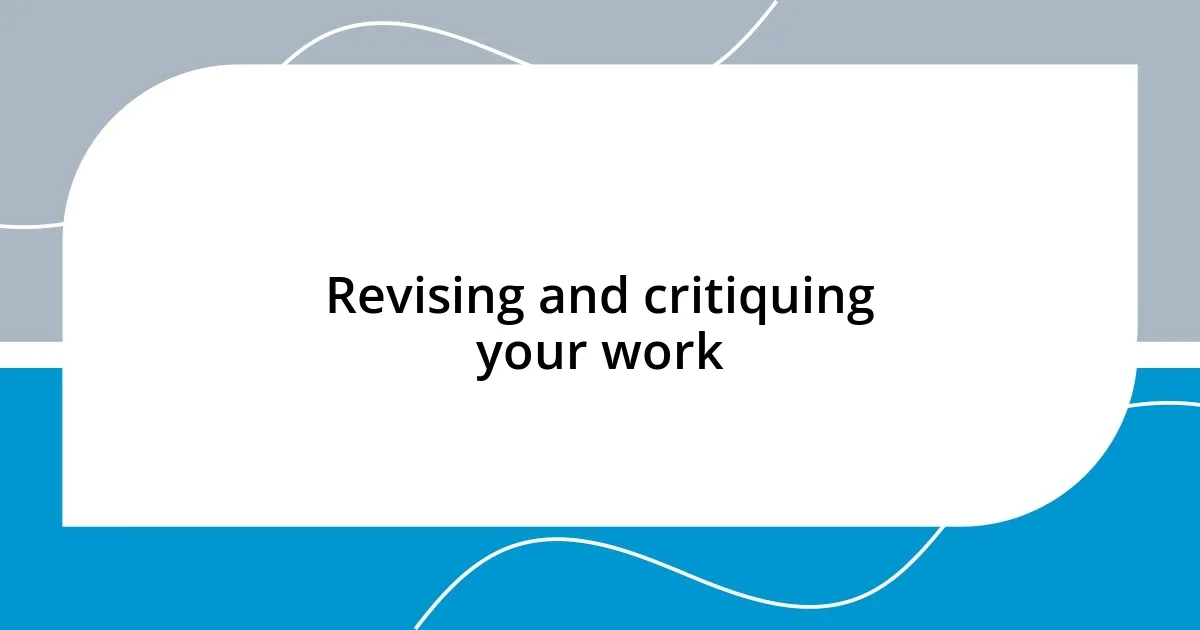
Revising and critiquing your work
Revising and critiquing your work is an essential skill every aspiring composer must hone. I vividly remember my first composition, which I proudly presented to my friends, eager for their praise. Instead, they pointed out a few awkward transitions and a melody that felt repetitive. Initially, it stung, but that critique opened my eyes to the importance of viewing my work through fresh perspectives. Have you ever had a moment where feedback made you rethink your creative choices? Those moments are invaluable.
When revising, I’ve learned to detach myself emotionally from the piece. I’ve found it hard, especially when I’ve poured my heart into a composition. However, treating my work more like a blueprint rather than a final product allows me to analyze it critically. For instance, when refining my recent score, I recognized that a particular section dragged on unnecessarily. Cutting it felt like eliminating a part of myself at first, but it ultimately made the piece more engaging. Have you ever experienced that bittersweet feeling of letting go for the greater good?
Lastly, seeking external opinions can be a game changer. I often invite fellow musicians to listen to my drafts, and their insights bring fresh elements that I wouldn’t have considered. It’s incredible how a simple suggestion to alter a chord or tweak a rhythm can invigorate an entire composition. Think about it—have you tapped into the collective creativity of your peers? Collaborative critique often reveals hidden gems in your work that you might overlook when working alone. Trust me, embracing this process enriches not only your music but also your growth as a composer.
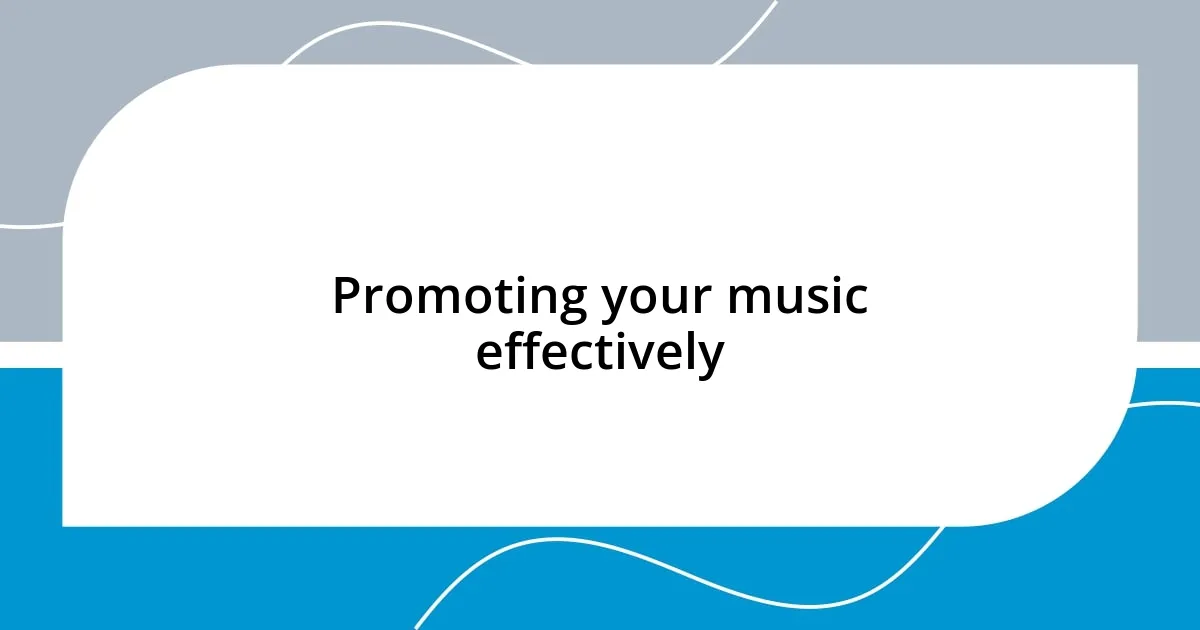
Promoting your music effectively
Promoting your music effectively is a crucial step in sharing your creative voice with the world. I remember when I first released a track online; I was amazed at how just a well-crafted social media post could draw in listeners. Have you experienced that moment when a single tweet or Instagram story transforms your audience overnight? It’s all about finding the right channels to showcase your work.
Networking is another powerful tool that can amplify your promotional efforts. In my early days, I reached out to local musicians and music bloggers. One simple collaboration led to an interview feature on a popular site. That experience taught me that building relationships matters just as much as the music itself. How often do you seek opportunities to connect with others in your field? You’d be surprised at how a friendly email or a comment on a post can open doors.
Additionally, don’t underestimate the power of storytelling. Every time I share the inspiration behind a composition, the response is overwhelming. Listeners want to connect with the emotion and journey that shaped your music. Have you considered how your personal stories could enhance your promotional content? By adding that layer of authenticity, you invite your audience to not just hear your music but feel it as well. It’s this connection that often keeps people coming back for more.

